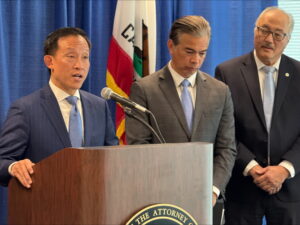Lawsuit challenges President Trump’s Executive Order that upends the century-old principle that those born in the United States are citizens
SAN FRANCISCO (January 21, 2025) — San Francisco City Attorney David Chiu and California Attorney General Rob Bonta announced today that they, along with a coalition of state Attorneys General, have filed a lawsuit and Motion for Preliminary Injunction to immediately block President Donald Trump’s recently-issued Executive Order seeking to end birthright citizenship.

Last night, President Donald Trump signed an Executive Order announcing a new policy to limit birthright citizenship. The Order directs federal agencies to refuse to issue documents recognizing citizenship for newborns with parents of certain immigration statuses and prohibits them from recognizing such documents from state and local governments.
Birthright citizenship is the long-standing, legal principle that anyone born in the United States is guaranteed citizenship regardless of the specific immigration status of their parents. This right is guaranteed under the Fourteenth Amendment’s Citizenship Clause, which states: “All persons born or naturalized in the United States, and subject to the jurisdiction thereof, are citizens of the United States and of the State wherein they reside.”
“Birthright citizenship is as clear cut as legal precedents come,” San Francisco City Attorney Chiu. “The Constitution’s guarantee of this right was affirmed in a 127-year-old Supreme Court case brought by a San Franciscan named Wong Kim Ark, who was born to immigrant parents. As a San Franciscan born to immigrant parents, I am determined to ensure the next generation of Americans are not deprived of this constitutional right. This Executive Order will significantly harm local jurisdictions like San Francisco that stand to lose significant federal funding should the order be upheld. It will sow confusion about the legal status of numerous newly-born American citizens.”
Background
In 1895, Wong Kim Ark, a Chinese American born in San Francisco on Sacramento Street to immigrant parents, was traveling back from China to his home in San Francisco. He was denied re-entry into the United States at the Port of San Francisco on the grounds that he was not a citizen and so was subject to the Chinese Exclusion Act, which prohibited entry of Chinese nationals into the United States. With the support of the Chinese Consolidated Benevolent Association, Wong Kim Ark challenged this decision all the way up to the U.S. Supreme Court. In 1898, the U.S. Supreme Court, in a 6-2 decision, ruled in favor of Wong Kim Ark, finding that the Citizenship Clause of the Fourteenth Amendment automatically made him a U.S. citizen, and thus, he could not be denied entry into his home country.
Subverting this 127-year-old legal precedent will cause chaos and confusion for expectant families and local agencies across the country, resulting in a significant loss of federal funding to state and local governments for programs available to citizens. For example, San Francisco is responsible for administering federal-state funded public benefits programs like CalWORKs and CalFresh. Federal funding to California, in turn distributed to counties like San Francisco, comprises a substantial portion of the aid administered through these assistance programs. San Francisco receives funding based, in part, on the number of eligible recipients, and eligibility depends on the citizenship status of recipients.
The Executive Order seeks to unlawfully deny citizenship to numerous newborns who should be eligible for these programs. Thus, the Executive Order will result in the direct loss of federal funding to San Francisco to provide aid and administer these programs. Yet, San Francisco will still have to bear the costs of caring for its residents, whether or not they are denied citizenship and eligibility for assistance programs.
This lawsuit is brought by California, Colorado, Connecticut, Delaware, District of Columbia, Hawai’i, Maine, Maryland, Massachusetts, Michigan, Minnesota, Nevada, New Mexico, New Jersey, New York, North Carolina, Rhode Island, Vermont, Wisconsin, and the City and County of San Francisco. The matter was filed today in the United States District Court for the District of Massachusetts. A copy of the lawsuit can be found here.
###
